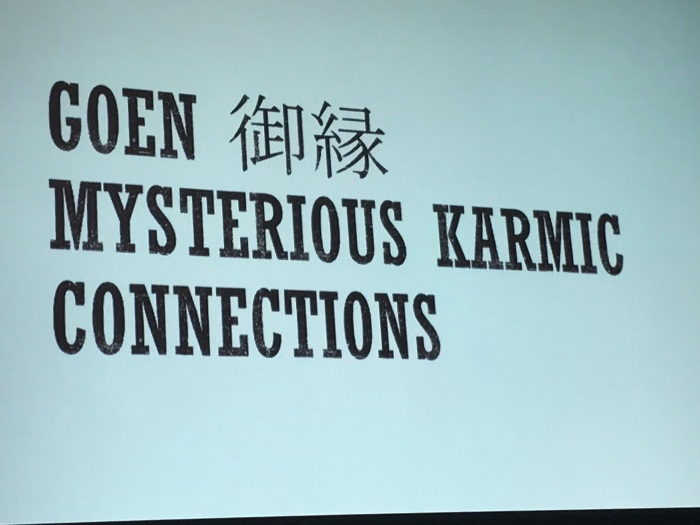Quick post – in my Dharma Message for this Sunday, I talked about “causes & conditions,” and in doing so, I referenced a slide from a presentation by Duncan Ryuken Williams. I used it partly so that people could see the kanji for “go-en” and liked Professor Williams’s translation, “Mysterious Karmic Conditions.” But I wasn’t looking at the slide when I was doing the talk, and when I was inserting the slide from the presentation into the video, I realized it actually says “Mysterious Karmic Connections”! Oops! I wonder if anyone noticed?

They aren’t really that different, and yet the two terms, “conditions” and “connections,” could be seen as having different nuances. The term “conditions” is deeply connected to the discourse of cause and effect – as I discussed during the Dharma Talk, conditions are a more peripheral type of cause. Normally we may think of cause and effect as a one-to-one equation, but there are actually many supporting conditions that bring about the resultant effect.
One place that the discourse of causality can be seen is in the Four Noble Truths, which first explains that “life is suffering.” Next, the cause of that suffering is revealed: desire, or sometimes ignorance & desire. Then the cure is shown – by removing the cause, one removes the result, so if one can get rid of ignorance & desire, then suffering can be removed. This equation is a classic example of cause & effect in Buddhism.
But this isn’t the only way to understand conditions, and maybe Duncan Williams’s use of the term “connections” points to another powerful way they are understood in Buddhism. This is an acknowledgment of the vast inconceivability of the conditions that make up my being here in this present moment. It’s not only the conditions that exist in the present (or previous?) moment, but the conditions that led to them, and on and on. And I am connected to all of them. In fact, I only exist in this present moment in relationship to all of those conditions. Some forms of Mahayana Buddhism, such as the Madhyamika School, find the essential purport of this truth to be the Emptiness of all things. This is Wisdom, the last of the Six Perfections. There is a whole class of Sutra literature devoted to this approach to Buddhism.
But Jodo Shinshu seems instead to focus on the significance those various connections have for my life. Realizing that I only exist because of others, whether because of their efforts or even just their existence. I am only a child because of my parents – even though my parents passed away almost 20 years ago I am still a son. And I am also a nephew, a cousin, a grandson and I am only those things because of my aunts and uncle, my cousins, my grandparents. I am only a Buddhist minister because of so many others – not only my teachers but also the people who I want to keep talking to about the things I discussed in a Dharma Talk. Current temple members, but also people I never even met in person, who may have passed away before I was born. Maybe all of that energy is part of the Compassion energy of the Buddha, the dynamic activity of the Vow whose ultimate goal is for me to attain awakening.
Hey, this was supposed to be a quick post! I should keep going, but also need to get this posted so that I can go to bed! Here is the original Dharma Message: